Dear Zazie, Here is today’s Lovers’ Chronicle from Mac Tag dedicated to his muse. Follow us on twitter @cowboycoleridge. Are you fallin’ or flyin’?
Special shout out to my friend Karen D. Lioness @DeadLioness for inspiration.
Rhett
The Lovers’ Almanac
Dear Muse,
© copyright 2020 mac tag/cowboy coleridge all rights reserved
© copyright 2019 mac tag/cowboy coleridge all rights reserved
sing us a song
with echoes
of a forgotten time
now hungered for
sing us a song
overwhelm us
with the sights
and sounds…
all dressed up
for cocktail parties,
sidewalk cafes,
così fan tutte,
walkin’ through
the marble halls
of forever
sing us a song
to remind us
that we can go back
that what was denied
has only been delayed
that the tide comes back
© copyright 2018 mac tag/cowboy coleridge all rights reserved
thanks Karen
it is not a matter
of lookin’
in the wrong place
it is the fallacy
of ever havin’ looked
in the first place
“Would you dive head first
into what could actually be,
or still do nothing?
I’m just wondering.”
oh my dear deadlioness,
that is the great question
i ebb and flow on the answer
right now, i am ebbin’
“The tide comes back
to land eventually, Mac Tag!”
indeed they do
and always have
but it seems like
the time between
the ebbs and flows
is gittin’ longer
© copyright 2017 mac tag/cowboy Coleridge all rights reserved
Fallin’ in love with you
sure felt like flyin’
Now fallin’ is all I feel
Today lyrics and a song for you. This was inspired by my friend Jett. This is one of his theme songs. Lyrics by Stephen Bruton and Gary Nicholson from the Crazy Heart soundtrack.
Fallin’ and Flyin’
I was goin’ where I shouldn’t go
Seein’ who I shouldn’t see
Doin’ what I shouldn’t do
And bein’ who I shouldn’t be
A little voice told me it’s all wrong
Another voice told me it’s all right
I used to think that I was strong
But lately I just lost the fight
It’s funny how fallin’ feels like flyin’
Even for a little while
Funny how fallin’ feels like flyin’
Even for a little while
I got tired of being good
start missing to feel that i am free
Stopped actin’ like I thought I should
Went on back to bein’ me
I never meant to hurt no one
I just had to have my way
If there’s such a thing as too much fun
This must be the price to pay
It’s funny how fallin’ feels like flyin’
Even for a little while
Funny how fallin’ feels like flyin’
Even for a little while
Never see it comin’ till it’s gone
It all happens for a reason
Even when it’s wrong
Especially when it’s wrong
It’s funny how fallin’ feels like flyin’
Even for a little while
Funny how fallin’ feels like flyin’
Even for a little while
I was goin’ where I shouldn’t go
Seein’ who I shouldn’t see
Doin’ what I shouldn’t do
And bein’ who I shouldn’t be
The Song of the Day is “Fallin’ and Flyin'” sung by Jeff Bridges

Today is the birthday of Henry Lerolle (Paris; 3 October 1848 – 22 April 1929); painter, art collector and patron. He studied at Académie Suisse. His work was exhibited at the Paris Salon in 1868, 1885, and 1895. Lerolle was made a Chevalier, Légion d’honneur in 1889. Lerolle’s paintings are in the collections of the Metropolitan Museum of Art, the Museum of Fine Arts, Boston, the Musée d’Orsay and the Fine Arts Museum of San Francisco.
Gallery
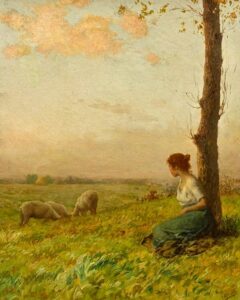
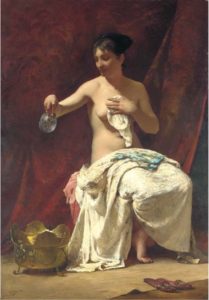
Toilette
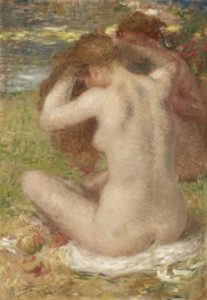
Bagneuses

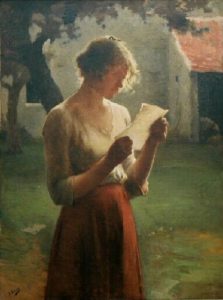
femme affichant une lettre
***************************************************************************
Gustave Loiseau

Today is the birthday of Gustave Loiseau (3 October 1865 in Paris – 10 October 1935 in Paris); Post-Impressionist painter, remembered above all for his landscapes and scenes of Paris streets.
Galerie
- Œuvres attribuées à Gustave Loiseau
-
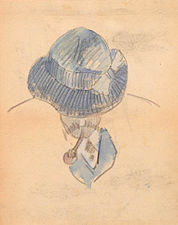
Portrait d’Émile Jourdan (vers 1900), localisation inconnue.
-

Rochers dominant la mer en Bretagne (vers 1906), localisation inconnue.
-

Port d’Henri IV, Paris (1918), localisation inconnue.
-

La rue de village, Saint-Cyr-du-Vaudreuil (1923), localisation inconnue.
-
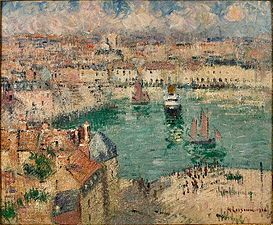
Le Port de Dieppe (1926), localisation inconnue.
-

Paris, Place de l’Étoile, Avenue Wagram (1929 ou 1930), localisation inconnue.
-

Vue de Pont-Aven, localisation inconnue.
-

Rue de village avec charrette, localisation inconnue.
-
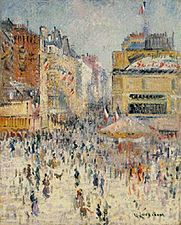
Le 14 juillet sur la rue de Clignancourt à Paris, vers 1925, musée Thyssen-Bornemizsa (Madrid).
| Pierre Bonnard | |
|---|---|

Portrait photograph of Pierre Bonnard, c.1899, Musée d’Orsay
|
|
Today is the birthday of Pierre Bonnard (Fontenay-aux-Roses, Hauts-de-Seine; 3 October 1867 — 23 January 1947 La Route de Serra Capeou, Le Cannet, French Riviera); painter and printmaker, as well as a founding member of the Post-Impressionist group of avant-garde painters Les Nabis. Bonnard preferred to work from memory, using drawings as a reference, and his paintings are often characterized by a dreamlike quality. The intimate domestic scenes, for which he is perhaps best known, often include his wife Marthe de Meligny.
Gallery

-

Claude Terrasse vers 1895, par Renoir (huile sur toile, coll. privée).

Andrée Bonnard avec ses chiens (1890, huile sur toile, 180 × 80 cm, coll. privée).

Autoportrait (1889, huile sur bois, 21,5 × 16 cm, coll. privée).

Portrait d’Édouard Vuillard par Vallotton (1893, huile sur panneau, coll. privée).
-
« Le Talisman » de Sérusier.
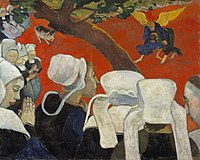 Bonnard est très frappé par la Vision après le sermon de Gauguin (1888, huile sur toile, 72 × 91 cm, Galerie nationale d’Écosse)20.
Bonnard est très frappé par la Vision après le sermon de Gauguin (1888, huile sur toile, 72 × 91 cm, Galerie nationale d’Écosse)20. L’Exercice (1890, huile sur toile, 23 × 31 cm, coll. privée).
L’Exercice (1890, huile sur toile, 23 × 31 cm, coll. privée). La Partie de croquet (1892, huile sur toile, 130 × 162,5 cm, Orsay).
La Partie de croquet (1892, huile sur toile, 130 × 162,5 cm, Orsay).-

Paravent (1889, détrempe sur coton teint, panneaux de 160 × 54,5 cm, coll.privée).
-

Deux chiens jouant (1891, 36 × 39,5 cm, musée de Southampton).
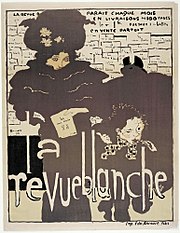 La Revue blanche (1894, lithographie, 80 × 62 cm, coll. privée).Le Corsage à carreaux (1892, huile sur toile, 61 × 33 cm, Musée d’Orsay).
La Revue blanche (1894, lithographie, 80 × 62 cm, coll. privée).Le Corsage à carreaux (1892, huile sur toile, 61 × 33 cm, Musée d’Orsay).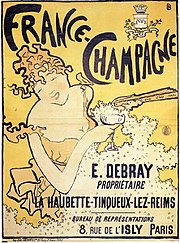 France-Champagne (1891, lithographie, 78 × 50 cm, coll. privée).
France-Champagne (1891, lithographie, 78 × 50 cm, coll. privée).-

Scène de famille (1893, lithographie, coll. privée).
-
La Femme au parapluie (1894, lithographie, 32,5 × 25 cm, coll. privée).
-

La petite blanchisseuse (1896, lithographie, 30 × 19 cm, coll. privée.
-

Le Boulevard (1896, lithographie, 17 × 43 cm, coll. privée).
-

La Promenade des Nourrices (1895-1897, panneaux lithographiés, 150 × 200 cm, National Gallery of Victoria).
 L’Omnibus (1895, huile sur toile, 59 × 41 cm, coll. privée).
L’Omnibus (1895, huile sur toile, 59 × 41 cm, coll. privée). La Fenêtre (1925, huile sur toile, 88,5 × 108,5 cm, Tate Modern).
La Fenêtre (1925, huile sur toile, 88,5 × 108,5 cm, Tate Modern).-

La Baignade (1893, huile sur toile, 35 × 27 cm, coll. privée).
-

Femme remontant ses bas (1893, coll. privée).
-
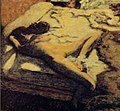
L’Indolente (1899, huile sur toile, 92 × 108 cm, Orsay).
 Le Repas des enfants (1895, huile sur carton monté sur bois, 60 × 74 cm, Metropolitan Museum of Art).
Le Repas des enfants (1895, huile sur carton monté sur bois, 60 × 74 cm, Metropolitan Museum of Art). Le dessin ornant ce poème de Verlaine fait écho à L’Indolente.
Le dessin ornant ce poème de Verlaine fait écho à L’Indolente. La Femme au perroquet (1910) condense des visions du Maghreb et de la Côte d’Azur86 (huile sur toile, 104 × 122 cm, coll. privée).
La Femme au perroquet (1910) condense des visions du Maghreb et de la Côte d’Azur86 (huile sur toile, 104 × 122 cm, coll. privée). La place de Clichy vue de l’intérieur de la brasserie Wepler (1912, huile sur toile, 139 × 205 cm, musée de Besançon).
La place de Clichy vue de l’intérieur de la brasserie Wepler (1912, huile sur toile, 139 × 205 cm, musée de Besançon).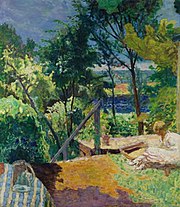 Marthe sur La Terrasse à Vernon (1923, huile sur toile, 120 × 105 cm, coll. privée).
Marthe sur La Terrasse à Vernon (1923, huile sur toile, 120 × 105 cm, coll. privée). L’Homme et la Femme (1900, huile sur toile, 115 × 72 cm, Musée d’Orsay).
L’Homme et la Femme (1900, huile sur toile, 115 × 72 cm, Musée d’Orsay). La Cheminée (1916, huile sur toile, 81 × 111 cm, coll. privée).
La Cheminée (1916, huile sur toile, 81 × 111 cm, coll. privée). Jeunes femmes au jardin (Renée Monchaty et Marthe Bonnard) (1921-1946, huile sur toile, 60,5 × 30 cm, coll. privée).
Jeunes femmes au jardin (Renée Monchaty et Marthe Bonnard) (1921-1946, huile sur toile, 60,5 × 30 cm, coll. privée).-

Le Pont des Arts (1905, huile sur toile, 55 × 70 cm, coll. privée).
-

La Loge (1908, huile sur toile, 91 × 120 cm, Musée d’Orsay).
-

La Glace du cabinet de toilette (1908, huile sur toile, 120 × 97 cm, Musée des Beaux-Arts Pouchkine).
-

Le Balcon bleu (1910, huile sur toile, 31,5 × 43,5 cm, Courtauld Gallery).
-

Le Jardin au crépuscule (vers 1901, huile sur toile, 37 × 44 cm, coll. privée).
-

La Terrasse à Grasse (1912, huile sur toile, 125 × 134 cm, coll. privée).
 La Symphonie pastorale (1916, huile sur toile, 130 × 160 cm, Orsay).
La Symphonie pastorale (1916, huile sur toile, 130 × 160 cm, Orsay). Assiette de fraises (1922, huile sur toile, 29 × 39 cm, coll. privée).
Assiette de fraises (1922, huile sur toile, 29 × 39 cm, coll. privée). Étienne Clémentel, Monet dans son jardin, vers 1917.
Étienne Clémentel, Monet dans son jardin, vers 1917.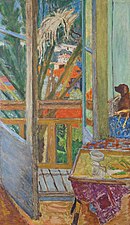 La Porte-fenêtre au chien (1927, huile sur toile, 107 × 63 cm, coll. privée).
La Porte-fenêtre au chien (1927, huile sur toile, 107 × 63 cm, coll. privée). Le Débarcadère (vers 1934, huile sur toile, coll. privée).
Le Débarcadère (vers 1934, huile sur toile, coll. privée). Paysage de la Côte d’Azur (1943, huile sur toile, coll. privée).
Paysage de la Côte d’Azur (1943, huile sur toile, coll. privée).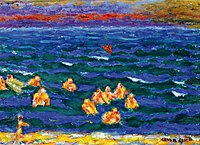 Baigneurs à la fin du jour (1945, huile sur toile, 48 × 69 cm, Le Cannet, Musée Bonnard).
Baigneurs à la fin du jour (1945, huile sur toile, 48 × 69 cm, Le Cannet, Musée Bonnard).-

Le Boxeur (1931, huile sur toile, 53 × 74 cm, coll. privée).
-

Autoportrait au col ouvert (1933, huile sur toile, 53 × 36 cm, Fond. Bemberg).
-
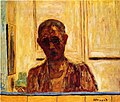
Autoportrait dans la glace (1939, huile sur toile, 56 × 68,5 cm, coll. privée).
-

Autoportrait (1945, huile sur toile, 55 × 46 cm, Fondation Bemberg).
 Le Cheval de cirque (1936-1946, huile sur toile, 94 × 118 cm, coll. privée).
Le Cheval de cirque (1936-1946, huile sur toile, 94 × 118 cm, coll. privée). L’Amandier en fleur (1946-1947, huile sur toile, 55 × 37,5 cm, Musée national d’Art moderne).
L’Amandier en fleur (1946-1947, huile sur toile, 55 × 37,5 cm, Musée national d’Art moderne). La villa Le Bosquet, aujourd’hui classée monument historique.
La villa Le Bosquet, aujourd’hui classée monument historique. Marthe a soixante ans quand est peint ce Nu à la baignoire (1931, huile sur toile, 120 × 110 cm, Musée national d’Art moderne).
Marthe a soixante ans quand est peint ce Nu à la baignoire (1931, huile sur toile, 120 × 110 cm, Musée national d’Art moderne). Iris et lilas (1920, huile sur toile, 57 × 63 cm, Fond. Bemberg).
Iris et lilas (1920, huile sur toile, 57 × 63 cm, Fond. Bemberg).-

Femmes au chien (1891, huile sur toile, 40 × 32 cm, Clark Art Institute).
-

La Table de toilette (1908, huile sur panneau, 52 × 45 cm, musée d’Orsay).
-

La Terrasse (1918, huile sur toile, 159 × 249 cm, The Phillips Collection).
-

Corbeille et assiette de fruits sur la nappe à carreaux rouges (1939, huile sur toile, 58 × 58 cm, Chicago).
-

L’Atelier au mimosa (1938-1946, huile sur toile, 127 × 127 cm, musée national d’Art moderne).
-

Nu dans le bain au petit chien (1941-1946, huile sur toile, 123 × 152 cm, Carnegie Museum of Art).
Vision mobile
 La Lampe (vers 1899, huile sur bois, 54 × 70,5 cm, FIA, Flint, Michigan).
La Lampe (vers 1899, huile sur bois, 54 × 70,5 cm, FIA, Flint, Michigan). Nu à contre-jour (1908, huile sur toile, 125 × 109 cm, Musées royaux des Beaux-Arts de Belgique).
Nu à contre-jour (1908, huile sur toile, 125 × 109 cm, Musées royaux des Beaux-Arts de Belgique). La Fenêtre ouverte (1921, huile sur toile, 118 × 96 cm, The Phillips Collection, Washington, DC).
La Fenêtre ouverte (1921, huile sur toile, 118 × 96 cm, The Phillips Collection, Washington, DC). La Sieste (1900, huile sur toile, 109 × 132 cm, Melbourne, National Gallery of Victoria).
La Sieste (1900, huile sur toile, 109 × 132 cm, Melbourne, National Gallery of Victoria).-

Daphnis et Chloé (coll. privée).
-

Effet de glace (1909, huile sur toile, 73 × 84,5 cm, coll. privée).
-

Nu accroupi au tub (1918, huile sur toile, 85 × 74 cm, Musée d’Orsay).
-

Nu rose à la baignoire (vers 1924, huile sur toile, 106 × 96 cm, coll. privée).
-

Le Bain (1925, huile sur toile, 120,5 × 86 cm, Tate gallery).
 Le Compotier (1924, huile sur toile, 74 × 31 cm, coll. privée).
Le Compotier (1924, huile sur toile, 74 × 31 cm, coll. privée). La Salle à manger à la campagne (1935, huile sur toile, 127 × 135 cm, Musée Guggenheim).
La Salle à manger à la campagne (1935, huile sur toile, 127 × 135 cm, Musée Guggenheim).-
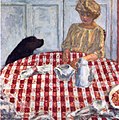
La nappe à carreaux rouges (1910, huile sur toile, 83 × 85 cm, coll. privée).
-

Intérieur (1913, huile sur toile, 56,5 × 63 cm, coll. privée).
-

La Table (1925, huile sur toile, 103 × 74,5 cm, Tate).
-

Intérieur blanc (1932, huile sur toile, 109 × 162 cm, Musée de Grenoble).
-

Nu dans un intérieur (1935, huile sur toile, 134 × 69 cm, National Gallery of Art).
-

Paysage avec saule et trois personnages (1912, huile sur toile, 73 × 69 cm, coll. privée).
-

La Sieste ou Soir (1914, huile sur toile, 84 × 113 cm, Musée des Beaux-Arts de Berne).
-

La Palme (1926, huile sur toile, 114 × 147 cm, The Phillips Collection).
-
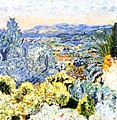
La Côte d’azur (1924, huile sur toile, 79 × 76 cm, The Phillips Collection).
-

Paysage d’automne (1932, huile sur toile support carton, 43 × 66 cm, coll. privée).
-

Le Jardin à midi (1943, huile sur toile, coll. privée).
-

La Salle à manger à la campagne (1913, huile sur toile, 165 × 205 cm, Minneapolis Institute of Art).
-

La Porte ouverte à Vernon (1921, huile sur toile, 114 × 112 cm, The Phillips Collection).
-

La salle à manger sur le jardin (1930, huile sur toile, 159 × 114 cm, Museum of Modern Art).
Portraits et autoportraits
 Autoportrait de l’artiste par lui-même (1930, crayon et gouache sur papier, 65 × 50 cm, coll. privée).
Autoportrait de l’artiste par lui-même (1930, crayon et gouache sur papier, 65 × 50 cm, coll. privée). Portrait de Misia Godebska (1908, huile sur toile, 145 × 114 cm, Thyssen-Bornemisza).
Portrait de Misia Godebska (1908, huile sur toile, 145 × 114 cm, Thyssen-Bornemisza).-

Petite fille au chat (1899, huile sur carton, 50 × 49 cm, coll. privée).
-

La Lettre (1906, huile sur toile, 55 × 47,5 cm, National Gallery of Art).
-

Femme accoudée avec chien et nature morte (1917, huile sur papier marouflée sur toile, 61 × 50 cm, coll. privée).
-
Les Frères Bernheim jeunes (1920, huile sur toile, 166 × 155 cm, Orsay).
-

Portrait d’Ambroise Vollard au chat (1924, huile sur toile, 96,5 × 111 cm, Petit Palais).
 Affiche de 1891 pour France-Champagne.
Affiche de 1891 pour France-Champagne.-

Maison dans la cour (1899, Quelques aspects de la vie de Paris, musée Van Gogh).
-

Coin de rue (1899, Quelques aspects de la vie de Paris, musée Van Gogh).
-

Rue, le soir, sous la pluie (1899, Quelques aspects de la vie de Paris, musée Van Gogh).
-

Le Marchand de quatre saisons (1899, Quelques aspects de la vie de Paris, musée Van Gogh).
-

L’Arc de triomphe (1899, Quelques aspects de la vie de Paris, musée Van Gogh).
 Eau-forte illustrant Dingo d’Octave Mirbeau (1924, Metropolitan Museum of Art).
Eau-forte illustrant Dingo d’Octave Mirbeau (1924, Metropolitan Museum of Art). Couverture d’une chanson (1898, Metropolitan Museum of Art).
Couverture d’une chanson (1898, Metropolitan Museum of Art).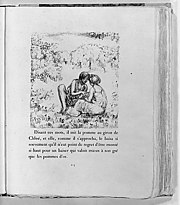 Une page de Daphnis et Chloé (1902, MET).
Une page de Daphnis et Chloé (1902, MET). Coin de table (1935, huile sur toile, 67 × 63,5 cm, Musée national d’Art moderne).
Coin de table (1935, huile sur toile, 67 × 63,5 cm, Musée national d’Art moderne).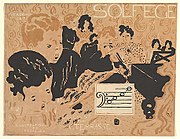 Couverture du Petit Solfège de Claude Terrasse (1893, lithographie, coll. privée).
Couverture du Petit Solfège de Claude Terrasse (1893, lithographie, coll. privée).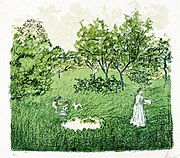 Le Verger (1899, lithographie).
Le Verger (1899, lithographie).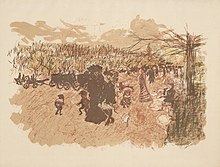 Avenue du Bois (1899, lithographie).
Avenue du Bois (1899, lithographie). Maurice Denis, Hommage à Cézanne (1900) (De gauche à droite : Redon, Vuillard, Mellerio, Vollard, Denis, Sérusier, Ranson, Roussel, Bonnard et Marthe Denis).
Maurice Denis, Hommage à Cézanne (1900) (De gauche à droite : Redon, Vuillard, Mellerio, Vollard, Denis, Sérusier, Ranson, Roussel, Bonnard et Marthe Denis). -
*********************************************************************************************************************************************************
| A. Y. Jackson | |
|---|---|

Jackson at work in Studio Building in Toronto
|
|
Today is the birthday of Alexander Young Jackson (Montreal; October 3, 1882 – April 5, 1974 Kleinburg, Ontario); Canadian painter and a founding member of the Group of Seven. Jackson made a significant contribution to the development of art in Canada, and was successful in bringing together the artists of Montreal and Toronto.
Gallery
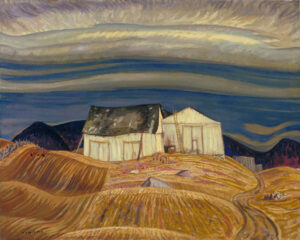
A Quebec farm,
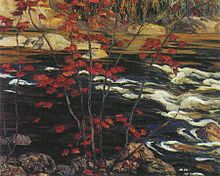

-

Cathedral at Ypres, Belgium
-

House of Ypres
-

Gas Attack, Lievin
-

Vimy Ridge from Souchez Valley
-

The Pimple, Evening (1918)
| Thomas Wolfe | |
|---|---|

1937 portrait by Carl Van Vechten
|
|
Today is the birthday of Thomas Clayton Wolfe (Asheville, North Carolina; October 3, 1900 – September 15, 1938 Baltimore, Maryland); novelist of the early twentieth century.
Wolfe wrote four lengthy novels as well as many short stories, dramatic works, and novellas. He is known for mixing highly original, poetic, rhapsodic, and impressionistic prose with autobiographical writing. His books, written and published from the 1920s to the 1940s, reflect on American culture and the mores of that period, filtered through Wolfe’s sensitive, sophisticated, and analytical perspective.
After Wolfe’s death, contemporary author William Faulkner said that Wolfe may have been the greatest talent of their generation for aiming higher than any other writer. Wolfe’s influence extends to the writings of Beat Generation writer Jack Kerouac, and of authors Ray Bradbury and Philip Roth. He remains an important writer in modern American literature, as one of the first masters of autobiographical fiction, and is considered North Carolina’s most famous writer.
He sailed to Europe in October 1924. From England he traveled to France, Italy and Switzerland. On his return voyage in 1925, he met Aline Bernstein (1880–1955), a scene designer for the Theatre Guild. Twenty years his senior, she was married to a successful stockbroker with whom she had two children. In October 1925, she and Wolfe became lovers and remained so for five years. Their affair was turbulent and sometimes combative, but she exerted a powerful influence, encouraging and funding his writing.
Of Time and the River (1935)
- His own power and magic — overwhelmed him for a moment with a feeling of the purest, highest, and most glorious happiness that life can yield — the happiness that is at once the most selfish and the most selfless — the happiness of the artist when he sees that his work has been found good, has for itself a place of honour, glory, and proud esteem in the hearts of men, and has wrought upon their lives the spell of its enchantment. At that instant he saw, in one blaze of light, an image of unutterable conviction, the reason why the artist works and lives and has his being — the reward he seeks — the only reward he really cares about, without which there is nothing. It is to snare the spirits of mankind in nets of magic, to make his life prevail through his creation, to wreak the vision of his life, the rude and painful substance of his own experience, into the congruence of blazing and enchanted images that are themselves the core of life, the essential pattern whence all other things proceed, the kernel of eternity.
- Play us a tune on an unbroken spinet, and let the bells ring, let the bells ring! Play music now: play us a tune on an unbroken spinet. Do not make echoes of forgotten time, do not strike music from old broken keys, do not make ghosts with faded tinklings on the yellowed board; but play us a tune on an unbroken spinet, play lively music when the instrument was new, let us see Mozart playing in the parlor, and let us hear the sound of the ladies’ voices. But more than that; waken the turmoil of forgotten streets, let us hear their sounds again unmuted, and unchanged by time, throw the light of Wednesday morning on the Third Crusade, and let us see Athens on an average day.
- They belonged to that futile, desolate, and forsaken horde who felt that all will be well with their lives, that all the power they lack themselves will be supplied, and all the anguish, fury, and unrest, the confusion and the dark damnation of man’s soul can magically be healed if only they eat bran for breakfast.
You Can’t Go Home Again (1940)

His enemy was time. Or perhaps it was his friend. One never knows for sure.
- Few buildings are vast enough to hold the sound of time, and now it seemed to George that there was a superb fitness in the fact that the one which held it better than all others should be a railroad station. For here, as nowhere else on earth, men were brought together for a moment at the beginning or end of their innumerable journeys, here one saw their greetings and farewells, here, in a single instant, one got the entire picture of the human destiny. Men came and went, they passed and vanished, and all were moving through the moments of their lives to death, all made small tickings in the sound of time–but the voice of time remained aloof and unperturbed, a drowsy and eternal murmur below the immense and distant roof.
- Book I, Ch. 5: The Hidden Terror
- Perhaps this is our strange and haunting paradox in America–that we are fixed and certain only when we are in movement. At any rate, this is how it seemed to young George Webber, who was never so assured of his purpose as when he was going somewhere on a train. And he never had the sense of home so much as when he felt that he was going there. It was only when he got there that his homelessness began.
- Book I, Ch. 5: The Hidden Terror
- To a future world,— inhabited, no doubt, by a less acute and understanding race of men, — all this may seem a trifle strange. If so, that will be because the world of the future will have forgotten what it was like to live in 1929.
- Book II, Ch. 14: Zero Hour
- He who lets himself be whored by fashion will be whored by time.
- Book II, Ch. 21: Love is Not Enough
- Now they saw it — its newness, its raw crudeness, and its strength — and turned their shuddering eyes away. “Give us back our well-worn husk,” they said, “where we were so snug and comfortable.” And then they tried word magic. “Conditions are fundamentally sound,” they said — by which they meant to reassure themselves that nothing now was really changed, that things were as they always had been, and as they always would be, forever and ever, amen. But they were wrong. They did not know that you can’t go home again. America had come to the end of something and to the beginning of something else. But no one knew what that something else would be and out of the change and uncertainly and the wrongness of the leaders grew fear and desperation and before long hunger stalked the streets. Through it all there was still only one certainty, though no one saw it yet. America was still America, and whatever new thing came of it would be American.
- Book III: An End and a Beginning
- His enemy was time. Or perhaps it was his friend. One never knows for sure.
- Book III, Ch. 26: The Wounded Faun
- Go, seeker, if you will, throughout the land and you will find us burning in the night.
- Book IV, Ch. 31: The Promise of America
- You can’t go back home to your family, back home to your childhood, … back home to a young man’s dreams of glory and of fame … back home to places in the country, back home to the old forms and systems of things which once seemed everlasting but which are changing all the time — back home to the escapes of Time and Memory.
- Book VI, Ch. 44: The Way of No Return
- To believe that new monsters will arise as vicious as the old, to believe that the great Pandora’s Box of human frailty, once opened, will never show a diminution of its ugly swarm, is to help, by just that much, to make it so forever.
- Book VII, Ch. 47: Ecclesiasticus
Mac Tag
I have done a heckuva lot of fallin and, oh my, there were times when it sure felt like flyin! – Jett


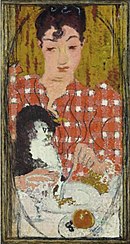


One Comment on "The Lovers’ Chronicle 3 October – tides – art by Henry Lerolle, Gustave Loiseau, Pierre Bonnard, & A.Y. Jackson – birth of Thomas Wolfe"
Trackbacks
[...] is the one that started comin’ to me while I was watchin’ the film Crazy Heart. It is [...]